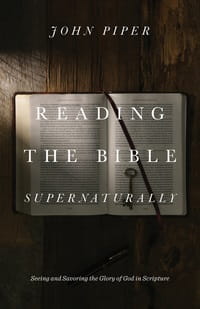What Kind of Worship Does God Want?

Two Pressing Questions
Two questions are pressing on us for answers.
First, what is the worship that the Bible says is the ultimate aim of all God’s work and word?
Second, why is God not a megalomaniac in demanding this kind of worship for himself?
I pose these two questions together because the answer to the first is key in answering the second.
C. S. Lewis on the Consummation of Praise
I first saw the relationship between these two questions with the help of C. S. Lewis. Before he was a Christian, God’s demand for worship was a great obstacle to Lewis’s faith. He said it seemed to him like “a vain woman who wants compliments.” But then as he discovered the nature of worship, the question about God’s seeming vanity (or megalomania) was also answered. He wrote:
But the most obvious fact about praise—whether of God or anything—strangely escaped me. I thought of it in terms of compliment, approval, or the giving of honor. I had never noticed that all enjoyment spontaneously overflows into praise. . . . The world rings with praise—lovers praising their mistresses, readers their favorite poet, walkers praising the countryside, players praising their favorite game—praise of weather, wines, dishes, actors, horses, colleges, countries, historical personages, children, flowers, mountains, rare stamps, rare beetles, even sometimes politicians and scholars.
My whole, more general difficulty about the praise of God depended on my absurdly denying to us, as regards the supremely Valuable, what we delight to do, what indeed we can’t help doing, about everything else we value.
I think we delight to praise what we enjoy because the praise not merely expresses but completes the enjoyment; it is its appointed consummation. It is not out of complement that lovers keep on telling one another how beautiful they are, the delight is incomplete till it is expressed.1
In other words, genuine, heartfelt praise is not artificially added to joy. It is the consummation of joy itself. The joy we have in something beautiful or precious is not complete until it is expressed in some kind of praise.
The Answer to God’s Seeming Megalomania
Lewis saw the implication of this for God’s seemingly vain command that we worship him. Now he saw that this was not vanity or megalomania. This was love. This was God seeking the consummation of our joy in what is supremely enjoyable—himself.
If God demeaned his supreme worth in the name of humility, we would be the losers, not God. God is the one being in the universe for whom self-exaltation is the highest virtue. For there is only one supremely beautiful being in the universe. There is only one all-satisfying person in the universe. And because of his supreme beauty and greatness, what the psalmist says in Psalm 16:11 is true: “In your presence there is fullness of joy; at your right hand are pleasures forevermore.” If God hides that, or denies that, he might seem humble, but he would be hiding from us the very thing that would make us completely happy forever.
But if God loves us the way the Bible says he does, then he will give us what is best for us. And what is best for us is himself. So if God loves us fully, God will give us God, for our enjoyment and nothing less. But if our enjoyment is not complete until it comes to completion in praise, then God would not be loving if he was indifferent to our praise. If he didn’t pursue our praise in all that he does (as we have seen!), he would not be pursuing the fullness of our satisfaction. He would not be loving.
So what emerges is that God’s pervasive self-exaltation in the Bible— his doing everything to display his glory and to win our worship—is not unloving; it is the way an infinitely all-glorious God loves. His greatest gift of love is to give us a share in the very satisfaction that he has in his own excellence, and then to call that satisfaction to its fullest consummation in praise. This is why I maintain that the supremely authentic and intense worship of God’s worth and beauty is the ultimate aim of all his work and word.
Supremely Authentic and Intense
But what about those words “supremely authentic and intense”? And what about that phrase “white-hot worship”? Our ultimate aim in reading the Bible, I am arguing, is that God’s infinite worth and beauty would be exalted in everlasting, white-hot worship. When I use the phrase “white-hot worship,” I am calling out the visceral implications of the words “supremely authentic and intense.” The reason words like these are important is that there is a correlation between the measure of our intensity in worship and the degree to which we exhibit the value of the glory of God. Lukewarm affection for God gives the impression that he is moderately pleasing. He is not moderately pleasing. He is infinitely pleasing. If we are not intensely pleased, we need forgiveness and healing. Which, of course, we do.
We know this because Jesus said to the church at Laodicea, “Because you are lukewarm . . . I will spit you out of my mouth” (Rev. 3:16). The opposite of being lukewarm in our affections for Jesus is what Paul commands in Romans 12:11, “Do not be slothful in zeal, be fervent in spirit . . .” The word fervent in the original (Greek ζέοντες, zeontes), means “boiling.” The intensity of our worship matters. Jesus indicted the hypocrites of his day by saying, “This people honors me with their lips, but their heart is far from me” (Matt. 15:8). Authentic worship comes from the heart, not just the lips.
Undivided and Fervent
A key measure of a heart’s worship is whether it is authentic and intense or divided and tepid. Authentic means undivided, genuine, real, sincere, unaffected. Intensity implies energy, vigor, ardor, fervor, passion, zeal.
The Bible does not leave us wondering what kind of worship God is aiming at in all his work and word. Over and over God calls for our hearts to be authentic and undivided in our worship. “You shall love the Lord your God with all your heart and with all your soul and with all your strength and with all your mind” (Luke 10:27). You shall “search after him with all your heart and with all your soul” (Deut. 4:29); and “serve the Lord your God with all your heart” (Deut. 10:12); and turn to him with all your heart (1 Sam. 7:3); and “trust in the Lord with all your heart” (Prov. 3:5); and “rejoice and exult with all your heart” (Zeph. 3:14); and give thanks to the Lord with your whole heart (Ps. 9:1). No competitors. No halfhearted affections.
And the Bible makes clear what level of worship intensity God is pursuing. When Peter wrote to the churches of Asia Minor, he did not consider inexpressible joy to be exceptional, but typical: “Though you do not now see him, you believe in him and rejoice with joy that is inexpressible and filled with glory” (1 Pet. 1:8). The psalmist had tasted this kind of joy and made it his lifelong quest. “As a deer pants for flowing streams, so pants my soul for you, O God. My soul thirsts for God, for the living God” (Ps. 42:1–2). “O God, you are my God; earnestly I seek you; my soul thirsts for you; my flesh faints for you, as in a dry and weary land where there is no water” (Ps. 63:1).
Similarly, the early Christians had tasted the joy set before them, and when they were called on to suffer with their imprisoned friends, they showed how intensely they cherished their heavenly treasure by the way they responded to losing their earthly one: “You had compassion on those in prison, and you joyfully accepted the plundering of your property, since you knew that you yourselves had a better possession and an abiding one” (Heb. 10:34; cf. 11:24-26; 12:2).
God is not pursuing lukewarm worship, but worship that is supremely authentic and intense—everlasting, white-hot worship. It will never end. “To him who sits on the throne and to the Lamb be blessing and honor and glory and might forever and ever!” (Rev. 5:13). Whitehot and without end. That’s the goal of creation and redemption.
1. C. S. Lewis, Reflections on the Psalms (New York: Harcourt, Brace & World, 1958), 93–95

John Piper (DTheol, University of Munich) is the founder and teacher of desiringGod.org and the chancellor of Bethlehem College & Seminary. He served for thirty-three years as the senior pastor of Bethlehem Baptist Church in Minneapolis, Minnesota, and is the author of more than fifty books, including A Peculiar Glory, Don’t Waste Your Life, This Momentary Marriage, Bloodlines, and Does God Desire All to Be Saved?
Image courtesy: ©Thinkstock/ofbeautifulthings
Publication date: May 1, 2017
Originally published May 01, 2017.







